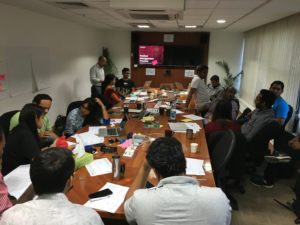Previously on ‘Failing Since 2012’ E01, E02, E03, E04, E05, Dinker Charak, Founder of Roo Kids app, talked about his startup journey. In this last post of the series, he summarizes the lessons learnt. Now read on …
I always start by pointing out it is failing and not failed! No one has given up. The journey is still on.
But, why failing? I believe that a startup is failing/dying every day. The day that stops, you have become a regular business. Even if you are profitable, you are still failing as you should be taking leaps and risks that can bring you down to the ground. That is how I define a startup.
To conclude the series, it makes sense to share my take on startups and lessons learnt. So here we go:
1. Co-Founders
If you can’t find the right co-founder, go solo! Do not get a co-founder because everyone says so.
I decided to go solo. Hence I am in a good position to give advice on co-founders! You know, at times the bystander has more clue than the people in the middle of a mess.
a. Be Prepared For Failure
Discuss failure and eminent closure. Discuss how will you disband the startup.
b. Be Prepared For Success
Nothing impedes like success. When that first big deal comes in. When that large chunk of cash comes in. When the pictures show up in the newspapers. When that panel guest invitation comes in. Be prepared for that. Who will do what and how will you share the limelight?
Definitely, be clear about how will that chunk of investor cash be used.
I know you will have a good plan that you must have discussed with the investors against which they invested in you. But plans seldom survive contact with reality. So discuss how changes in plans will be handled.
c. Be Prepared for Uneventfulness
OK, I don’t even know if that is a real word. Still …
90% of your days will be uneventful. You will do what you were doing the day before. Many days you will have no clue what to do next.
This is the biggest secret ever kept. Not all days are full of action and results and decisions and power meetings and OK-GO music running as the soundtrack to your life.
Most days are spent doing the same stuff and at times being adrift and clueless on how to make the next big thing happen. You will sit at your desk with your head in your hands, pulling your hair and wondering what should you do to get things to work!
Be ready to see each other in this pose and be seen in this pose.
2. Fund Raising
Unless you have reverse engineered the funding patterns and built a startup that has all elements investors are looking for, funding is going to be a nightmare.
This is what I mean by reverse engineering the Series A funding patterns: If you are in India, as per current gossip, pick a product that is doing good in the US, be a young male, gather a few IIT grads and go pitch! Or, pick an e-commerce idea, show how you can get millions of rupees flow through your system (even if 80% of that will come from investors via Discounted Cash Flow), be a young male, gather a few IIT grads and go pitch!
But I digress.
a. Always Have Investors
Fine, you can bootstrap. Fine, you can generate revenue. Fine, you can do it with your own money. Still!
Nothing challenges your optimism than to sit in front of someone and get her or him to see your vision. You are the entrepreneur. You are the ones with dreams, energy and will to dent the universe. But if you can’t convince even one person to buy in, something is not right.
You need to get an investor to make sure you know that you are a seer and not delusional.
b. Find an Entrepreneur-Investor
All my early investors were entrepreneurs themselves. They had seen failures / tough days and have achieved big success.
So every once in a while I get a, “I hear you! Keep going. It’s a marathon, not a sprint.”
Nothing strengthens your core than someone who has followed the pagdandi and found success.
Also, there is one more thing: It has to be their own money they are investing. They will decide to invest in you based on the same gut feeling and analytics that made them successful in the first place. This is a massive upvote!
c. Say No to Institutional Money
Here is how I think VCs work. They take a bunch of money from rich people and organizations and promise them some x return in n time. Say 10x return in 7 years. Along the way, they assure that their money will make the lives of the poor, middle class, diseased, etc. better.
The only (and big) difference between someone who is investing her / his own money and someone else’s money is the flexibility on time!
Never hesitate to take money from an entrepreneur. Think a lot before taking it from a VC during the early days. Go to a VC when you are sure you can get them the returns on their investment in a predictable span of time.
3. Conserve Cash
Cash in hand is the only friend you have. Conserve it. Instead of paying someone in cash, see if you can pay back in kind. Pay closer to due dates. Don’t spend on something you did not need critically last week/yesterday. Try the trial version before buying the full product. Use open source or free versions.
4. Get a Life
If your startup is the only thing going for you, here is what you need to do: get a life!
Very soon you will run out of money or ideas or friends or energy or all of these in one go. What will you turn to then? How will you get your groove back?
Nothing invigorates me like a short trip to a nature-rich destination. You should find something similar.
5. Pivot, Experiment, Concede, Change
Very rarely does a successful startup get everything right from the very beginning. So be ready to pivot around one successful aspect of your startup, experiment, concede when you are wrong and be ready to change.
Success is directly proportional to your elasticity and plasticity.
6. Lead from Front
Be a leader of your team. They will turn to you for vision, direction, ideas, etc. Always be a few steps ahead of them. And that means you have to work harder than anyone else in the team.
Always be full of ideas for them to try out. Always be ready to focus on what’s next, rather than failure. Don’t waste time blaming them and spend time nudging them into all new directions.
7. Hiring & Firing
Hire people better and smarter than you. Give them a purpose and direction, be transparent about how they will be judged and then get out of their way!
And if you hire a person who is not right for the task, fire early. No point in letting them continue. They will not have a good time working with you, others working with them will not have a good time and you will burn cash!
Guide them in finding a job that suits them best and let go.
Do not turn a misfit employee into your favourite project. Do not believe you can make it work somehow, however smart or great a people person you are.
Other hard-working & performing employees will feel demotivated when they see an under-performer getting the same benefits. The under-performer will feel bad that inspite of being smart and hardworking your startup is unable to give the role she or he can excel in.
It is not going to work and all involved will suffer.
8. Personality
Forget aura, charisma, reality-distortion field, etc. Develop a sense of humour (the self-deprecating kind is best), learn to praise others and be patient when dealing with people.
Conclusion
In conclusion of this series: It has been a wonderful journey, met wonderful people and learn a lot about myself.
My aim is to treat kids more than just school-going, IQ-improving and exam-passing bots. They are individuals who have a purpose and personality of their own and deserve the best of new technology and innovations. Roo Kid is one of the ways I am working on this aim.
I hope to succeed in building a neat product and taking it to the right audience. Along the way, I will have fun, meet more wonderful people, make difference in lives and maybe make money!
Wish me luck! 🙂



